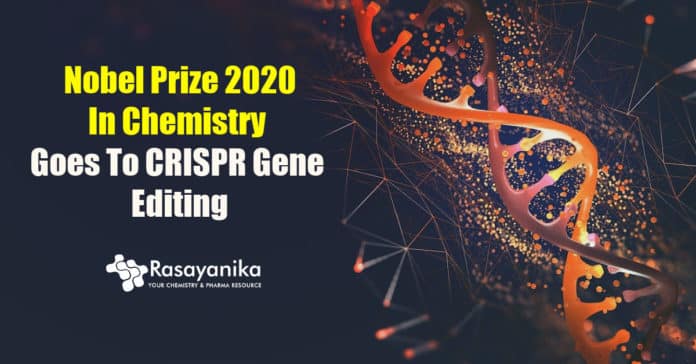Nobel prize in chemistry goes to CRISPR gene editing
Nobel Prize in Chemistry 2020 was awarded to two scientists for developing tools to edit DNA.
Emmanuelle Charpentier and Jennifer Doudna were declared as this 2020’s winners for their research on genome editing technology.

Their discovery, referred to as CRISPR-Cas9, is a means of making specific and accurate changes to the DNA present in living cells.
Both of them are the first women to share the award without a male co-worker.
They were awarded prize money of 10 million kronor (₤ 861,200), which will be shared by them.
Discussing her victory, Professor Emmanuelle Charpentier, Max Planck Unit for the Science of Pathogens, Berlin, stated that she was emotional on knowing about the award.
She added that when it occurs, we are extremely stunned, and think it’s unreal. However, it is certainly real.
While Emmanuelle Charpentier was working with the bacterium Streptococcus pyogenes, she found a previously unidentified molecule known as tracrRNA. Her research revealed that tracrRNA is a part of the organism’s immune defenses.
By cleaving the DNA of viruses, CRISPR/Cas disarms viruses.
Charpentier began cooperation
with Doudna to recreate the bacterium’s genetic scissors in a test tube, in 2011, the exact same year she released this work. Additionally, they worked on simplifying the scissors’ molecular elements so they were simpler to utilize.The bacterial scissors, in all-natural form, identify DNA from viruses. However, Charpentier as well as Doudna revealed that they can be reprogrammed to cut any DNA molecule at a particular site. Cutting the DNA then enables the code of life to be revised.
Talking about the discovery, Pernilla Wittung-Stafshede, a biological chemist stated that the capacity to cut DNA where you want has actually revolutionized the biosciences.
Claes Gustafsson, Chemists included that they can edit any kind of genome, they can ask all types of questions, including that it could be used to treat genetic diseases.
Professor Charpentier on being one of the first two females to share the award stated that she wished that this will certainly give a positive message especially for young women who would like to follow the path of scientific research and to reveal them that females in science can additionally have an influence with the study they are carrying out.
She proceeded and this is not just for females, however, they see a clear lack of interest in complying with a scientific path, which is extremely distressing.
Alfred Nobel, Swedish industrialist founded the prizes in his will, written in 1895 – a year prior to his demise.
Author: Sruthi S

















































